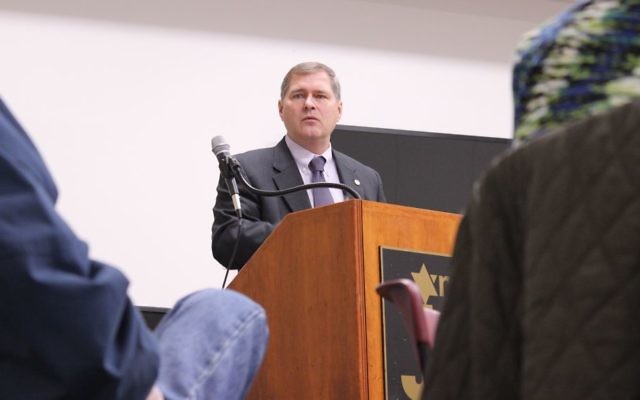Edgewise Gets Look Inside Surveillance
Emmett emphasizes a need for more cooperation with FBI from outside agencies
President Donald Trump’s claim that his predecessor had his phones tapped in the final weeks of last year’s presidential campaign has brought fresh attention to the Foreign Intelligence Surveillance Act and the use of FISA courts to approve surveillance operations.
But members of the Edgewise group at the Marcus Jewish Community Center got their own FISA primer Thursday, Feb. 16, when FBI Special Agent Stephen Emmett, a 30-year bureau veteran from Marietta who works in the Atlanta Field Office, spoke about the agency’s history and operations.
He discussed the PATRIOT Act and the impact of the Sept. 11 attacks on the structure and perception of the FBI and the rest of federal law enforcement.
“We almost didn’t survive as an agency,” Emmett said. “Our intelligence side of the house was under a lot of scrutiny for not stopping that 9/11 disaster.”
He said the PATRIOT Act ramped up the use of FISA courts for wiretaps. “The government presents its case to (federal judges), but it’s just done in a more secretive manner, and they’re all dealing with national security matters.”
Those matters are far different from the issues that drove the development of the FBI nearly a century ago in an era of violent gangsters and somewhat helpless local police.
“They were skipping across state lines,” Emmett said of criminals. “They would just evade local law enforcement by skipping over into neighboring states, and that’s where the FBI stepped up.”
The FBI’s popularity with civilians and certain industries has deteriorated since the tenure of FBI Director J. Edgar Hoover, Emmett said. “He seized upon that time period to really elevate us in the public eye with the top 10 most wanted programs, identifying these folks that were the most egregious of public enemies.”
He said the bureau still owes Hoover gratitude for centralizing its fingerprint identification operations.
Asked about FBI cooperation with local law enforcement, Emmett explained the mutually beneficial relationship. “We have task forces now where these officers are embedded with us, and what that does for us — it’s a force multiplier for us, but it also gives their chiefs eyes and ears at our table.”
The FBI empowers certain officers in local law enforcement, Emmett said, by granting them national jurisdiction and validity through federal task forces.
Law enforcement cooperation doesn’t always go well.
“In 2005 at a bank robbery matter in Conyers, I was shot in the leg,” Emmett said, “and I will confide in you that the behind-the-scenes story was that it was in fact friendly fire.”
He said a detective on the other side of a car shot through the vehicle and hit him in the thigh. “I can tell you what our own ammo feels like when you get hit by it, and it’s a sledgehammer.”
Emmett refers to the Cold War era of the FBI as the “spy era.” He discussed the spy activities of John Anthony Walker, a Navy sailor who was convicting of being a Soviet informant.
“We now believe that that is how the North Vietnamese were able to intercept and shoot down a lot of our aircraft during the Vietnam War,” Emmett said. “They were reading our encrypted transmissions, so they knew more than we thought they did at the time.”
These days, Emmett is concerned about a lack of cooperation from technology companies. He stressed the importance of the private sector and federal law enforcement working together.
The issue was brought to public attention when Apple declined to write software to help the FBI unlock an iPhone that belonged to one of the shooters in the San Bernardino attack in December 2015. Eventually, however, the FBI purchased a third-party tool and was able to unlock the phone.
The Domestic Security Alliance Council was created in 2012 to enhance cooperation between the federal government and the private sector and enable the FBI to be more proactive and less reactive. The Southern Co. is one private entity that meets regularly with federal officials as part of the DSAC.




comments